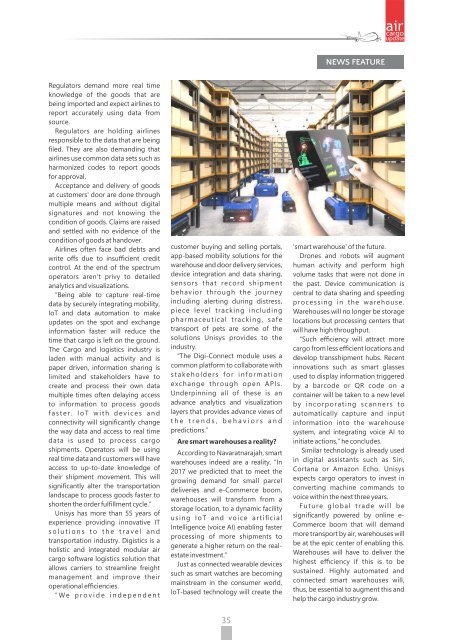Create successful ePaper yourself
Turn your PDF publications into a flip-book with our unique Google optimized e-Paper software.
NEWS FEATURE<br />
Regulators demand more real time<br />
knowledge of the goods that are<br />
being imported and expect airlines to<br />
report accurately using data from<br />
source.<br />
Regulators are holding airlines<br />
responsible to the data that are being<br />
filed. They are also demanding that<br />
airlines use common data sets such as<br />
harmonized codes to report goods<br />
for approval.<br />
Acceptance and delivery of goods<br />
at customers' door are done through<br />
multiple means and without digital<br />
signatures and not knowing the<br />
condition of goods. Claims are raised<br />
and settled with no evidence of the<br />
condition of goods at handover.<br />
Airlines often face bad debts and<br />
write offs due to insufficient credit<br />
control. At the end of the spectrum<br />
operators aren't privy to detailed<br />
analytics and visualizations.<br />
“Being able to capture real-time<br />
data by securely integrating mobility,<br />
IoT and data automation to make<br />
updates on the spot and exchange<br />
information faster will reduce the<br />
time that cargo is left on the ground.<br />
The Cargo and logistics industry is<br />
laden with manual activity and is<br />
paper driven, information sharing is<br />
limited and stakeholders have to<br />
create and process their own data<br />
multiple times often delaying access<br />
to information to process goods<br />
f a s t e r . I o T w i t h d e v i c e s a n d<br />
connectivity will significantly change<br />
the way data and access to real time<br />
data is used to process cargo<br />
shipments. Operators will be using<br />
real time data and customers will have<br />
access to up-to-date knowledge of<br />
their shipment movement. This will<br />
significantly alter the transportation<br />
landscape to process goods faster to<br />
shorten the order fulfillment cycle.”<br />
Unisys has more than 55 years of<br />
experience providing innovative IT<br />
s o l u t i o n s t o t h e t r a v e l a n d<br />
transportation industry. Digistics is a<br />
holistic and integrated modular air<br />
cargo software logistics solution that<br />
allows carriers to streamline freight<br />
management and improve their<br />
operational efficiencies.<br />
“ W e p r o v i d e i n d e p e n d e n t<br />
customer buying and selling portals,<br />
app-based mobility solutions for the<br />
warehouse and door delivery services,<br />
device integration and data sharing,<br />
sensors that record shipment<br />
behavior through the journey<br />
including alerting during distress,<br />
piece level tracking including<br />
pharmaceutical tracking, safe<br />
transport of pets are some of the<br />
solutions Unisys provides to the<br />
industry.<br />
“The Digi-Connect module uses a<br />
common platform to collaborate with<br />
s t a k e h o l d e r s f o r i n f o r m a t i o n<br />
exchange through open APIs.<br />
Underpinning all of these is an<br />
advance analytics and visualization<br />
layers that provides advance views of<br />
t h e t r e n d s , b e h a v i o r s a n d<br />
predictions.”<br />
Are smart warehouses a reality?<br />
According to Navaratnarajah, smart<br />
warehouses indeed are a reality, “In<br />
2017 we predicted that to meet the<br />
growing demand for small parcel<br />
deliveries and e-Commerce boom,<br />
warehouses will transform from a<br />
storage location, to a dynamic facility<br />
using IoT and voice artificial<br />
Intelligence (voice AI) enabling faster<br />
processing of more shipments to<br />
generate a higher return on the realestate<br />
investment.”<br />
Just as connected wearable devices<br />
such as smart watches are becoming<br />
mainstream in the consumer world,<br />
IoT-based technology will create the<br />
'smart warehouse' of the future.<br />
Drones and robots will augment<br />
human activity and perform high<br />
volume tasks that were not done in<br />
the past. Device communication is<br />
central to data sharing and speeding<br />
processing in the warehouse.<br />
Warehouses will no longer be storage<br />
locations but processing centers that<br />
will have high throughput.<br />
“Such efficiency will attract more<br />
cargo from less efficient locations and<br />
develop transshipment hubs. Recent<br />
innovations such as smart glasses<br />
used to display information triggered<br />
by a barcode or QR code on a<br />
container will be taken to a new level<br />
by incorporating scanners to<br />
automatically capture and input<br />
information into the warehouse<br />
system, and integrating voice AI to<br />
initiate actions,” he concludes.<br />
Similar technology is already used<br />
in digital assistants such as Siri,<br />
Cortana or Amazon Echo. Unisys<br />
expects cargo operators to invest in<br />
converting machine commands to<br />
voice within the next three years.<br />
Future global trade will be<br />
significantly powered by online e-<br />
Commerce boom that will demand<br />
more transport by air, warehouses will<br />
be at the epic center of enabling this.<br />
Warehouses will have to deliver the<br />
highest efficiency if this is to be<br />
sustained. Highly automated and<br />
connected smart warehouses will,<br />
thus, be essential to augment this and<br />
help the cargo industry grow.

















